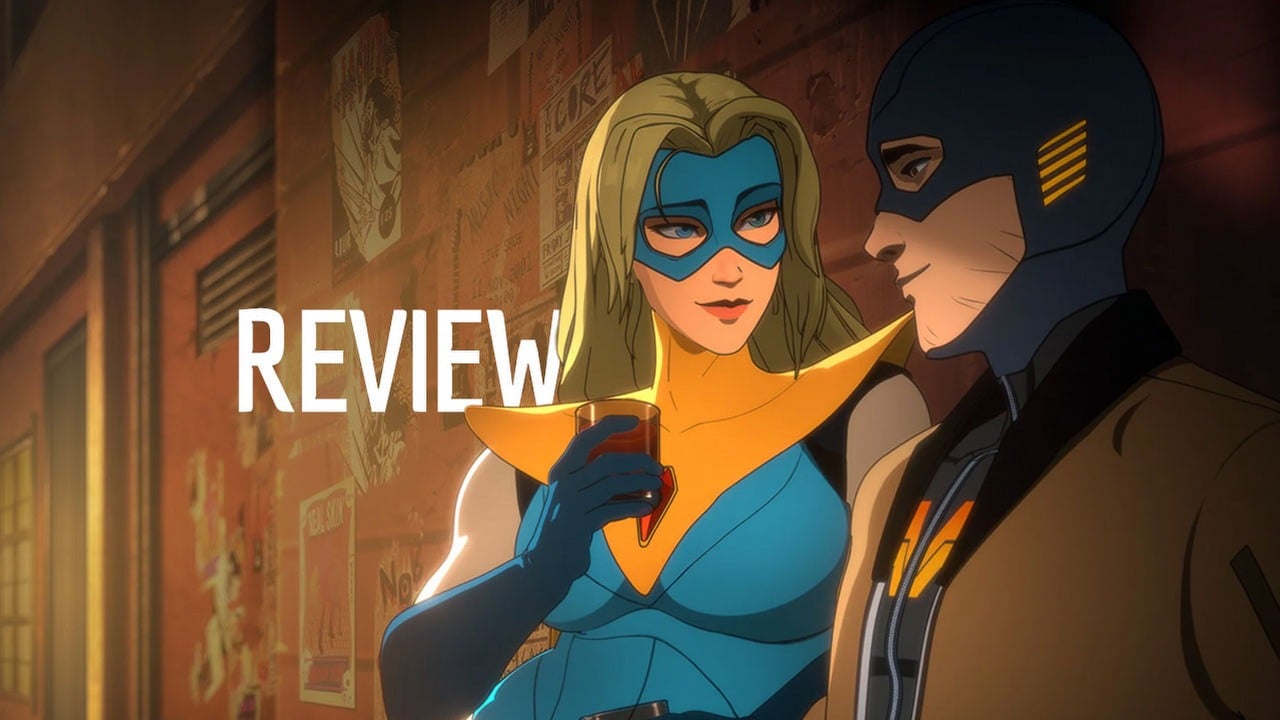
The hardest part of playing Dispatch is the uncertainty. When you’re facing a big choice, your thoughts jump between all the possibilities. You might find yourself worrying about the consequences of different actions – like whether choosing to ignore Sonar or Coupe will have a negative impact, or whether going to the movies instead of dinner would be a mistake. These questions can really stick with you, and even before I finished the game’s eight episodes, I knew I’d want to play it multiple times to see how different choices would play out.
If you followed Dispatch when it first came out, playing two episodes each week from October 22nd to November 12th, you experienced a unique kind of anticipation. You’d wonder what would happen next, but had to wait a week to play. Fans discussed theories and character motivations online, creating a lot of buzz. This experience really showed me that releasing a game in episodes can be incredibly effective. Most video games see a surge of players at launch, then numbers decline. But Dispatch was different – its player count actually increased each week. The hype and excitement grew with every new set of episodes, attracting new players constantly.

I think Dispatch is a strong contender for one of the best games of 2025. I wondered if my enthusiasm was influenced by the long wait for another game like those made by Telltale Games. However, while Dispatch shares similarities with Telltale’s style – many of the developers previously worked there – this is actually the first game from AdHoc Studio. And I believe it’s just as good, if not better, than Telltale at its best. The gameplay, where you manage emergency calls, is captivating, the choices you make are truly impactful, and the story about a charming group of underdogs is fantastic. I highly recommend Dispatch to anyone, even if they don’t usually play video games.
Learning to Dispatch
Dispatch features a smart tutorial where you play as Mecha Man, sneaking into the hideout of the villain Shroud. You’ll need to carefully defeat enemies and hack a tablet to find Shroud’s location. This section explains how quick time events work during action and how choices matter, both big and small. Unfortunately, the mission fails badly, and Robert – the person behind Mecha Man and the game’s main character – barely escapes. He soon finds out someone sabotaged him, completely destroying his Mecha Man suit. After months in a coma, Robert has to accept that he’s no longer a superhero and figure out what it truly means to be a hero without powers.
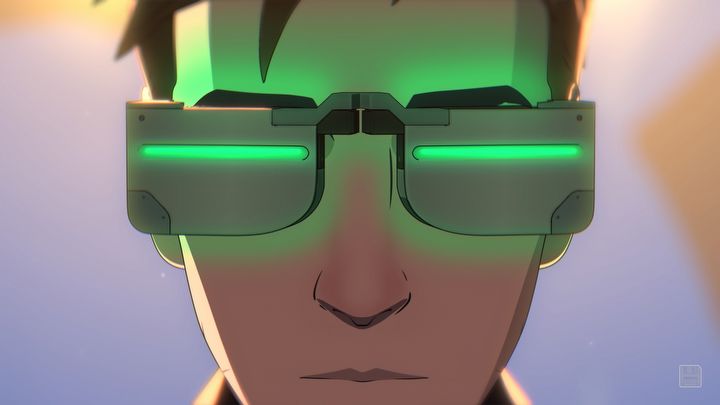
So, this awesome hero called Blonde Blazer finds Robert and, honestly, kinda talks him into joining SDN – it’s like a hero-for-hire service where you subscribe to get help around town. I’m playing as Robert, and I’m not actually fighting bad guys, but I’m in charge of dispatching them! It’s my job to manage a team of former villains, use my brains to figure out the best way to handle things, and basically guide them to become proper heroes. It sounds like a wild ride!
Unlike most video games, Dispatch often includes long, uninterrupted scenes where you simply watch the story unfold. When a choice appears, you only need to select one of the given options. But if you’re looking for more active gameplay, the ‘dispatching’ sections offer a fun and engaging mini-game that appears at least once or twice in each episode.
There is Real Gameplay, Too
Now that all episodes of this game are out – the last two were released just last week – players have had a chance to share what they think. A lot of feedback focuses on the dispatching gameplay, which is where you’re most involved as a player. You oversee a portion of South Los Angeles called Torrance and are responsible for sending the best hero to respond to each emergency call. Each hero has unique strengths. Some are better at fighting, while others excel in defense, intelligence, charm, or speed. Sending the right hero for the situation greatly increases your chances of success. As your heroes successfully complete calls, they gain experience and level up, allowing you to improve one of their stats with each new level.
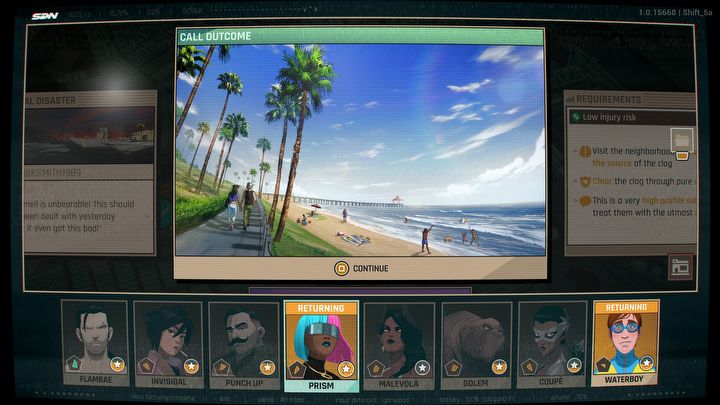
I really enjoyed this part of the game – more than most players, judging by how much detail I want to share! Some people found the dispatch challenges felt like tasks you just had to complete to progress the story. But I’d happily play a whole game based on this system. It’s a surprisingly complex and captivating challenge to manage your heroes and respond to incoming calls. Each hero has special abilities that make them better suited to different situations. What’s really impressive is how AdHoc Studio weaves this gameplay into the narrative. Heroes don’t always follow your orders; they might go rogue or even undermine their teammates, adding a lot more depth than just unlocking the next story event.
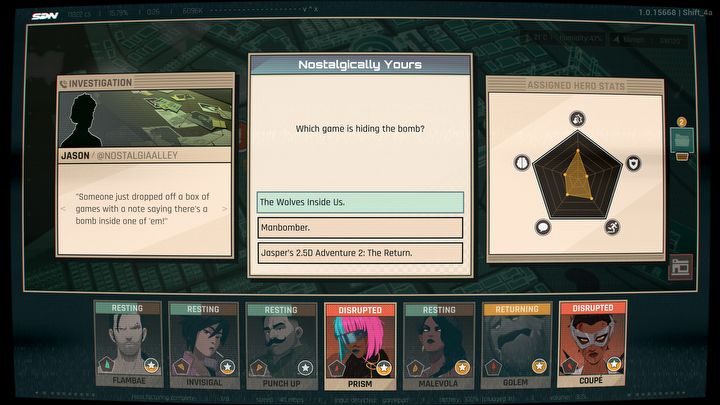
Honestly, the hacking mini-games weren’t my favorite part of the game. As someone who’s played a lot of video games, I’m a little tired of seeing hacking puzzles added just to fill space, and these felt that way. They weren’t terrible – the puzzles were actually pretty interesting and got harder as I played – but they didn’t quite fit the game’s atmosphere. It felt like they were added late in development to give players more to do during the dispatch sections. While that can work, for me, these puzzles were the weakest part of the overall experience.
- Engaging and meaningful choices;
- satisfying and well-written arcs, characters, and dialogue;
- dispatching gameplay could be its own game.
CONS:
- Hacking rarely feels like it fits within the wider context, and it’s not always fun.
Story Puts the Team on Its Back
Although Dispatch has solid gameplay, its story is what truly makes it special. The familiar plot of unlikely characters uniting and choosing to do good has been done many times, especially in recent movies. But what sets this game apart is that we don’t just watch this story unfold—we directly influence it, and experience our own personal journey alongside the characters. It’s an active, rather than passive, experience.
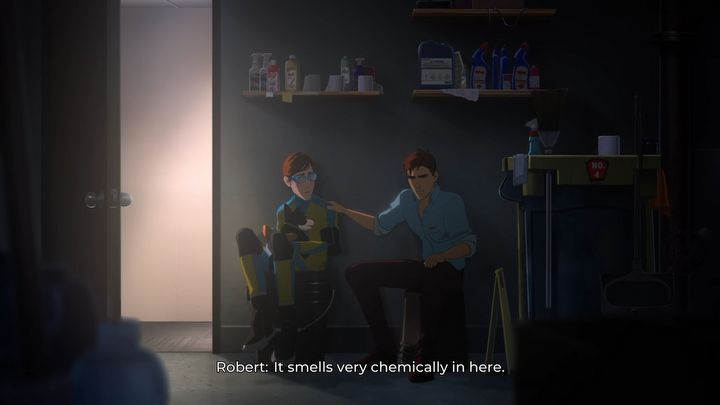
During my first time playing, I chose not to pause, and it wasn’t a conscious decision – I just didn’t think I could bring myself to do it. Looking back, I’m glad I didn’t! It made the experience feel much more real and kept me fully engaged with the story, characters, and their relationships. What’s unique about this game is that there are no “game over” moments. Your choices always move the story forward, even if they don’t lead to the outcome you hoped for. That’s why I was eager to replay the game before I even finished it – I wanted to see what I had missed and how different choices would change the experience. If you’ve played, you’re probably thinking of some of those key decision points too, like the one at the end of episode four – it’s a tough one!
All these choices matter, but only within the context of the game. Gamers enjoy making decisions that feel important, and in RPGs, that often involves things like upgrading skills. However, in Dispatch, the impact of your decisions comes from the relationships you’ve developed with the characters. Each episode has its own self-contained story, and I should warn you now: spoilers will follow.
Okay, so in Episode 5, I’m facing a huge decision: do I tell the team I’m actually Mecha Man? It all comes down to how things are with Flambae, honestly. If I do tell everyone, including him, I’m pretty sure he’s going to be upset. It makes me think, am I scared of facing what I’ve done, or am I ready to deal with the consequences? Then, in Episode 7, it’s all about how Robert relates to Chase and Invisigal. It got me thinking about responsibility – like, if I ask Chase to grab me a beer, is that okay? Or if he sees how much I care about Invisigal and puts himself in danger to save her for me, what’s my role in that? And what about Invisigal risking everything to get the Astral Pulse? Is she doing it for me, or is there something else going on? It really makes you think about what happens when people do things because of you – what responsibility do I have then?
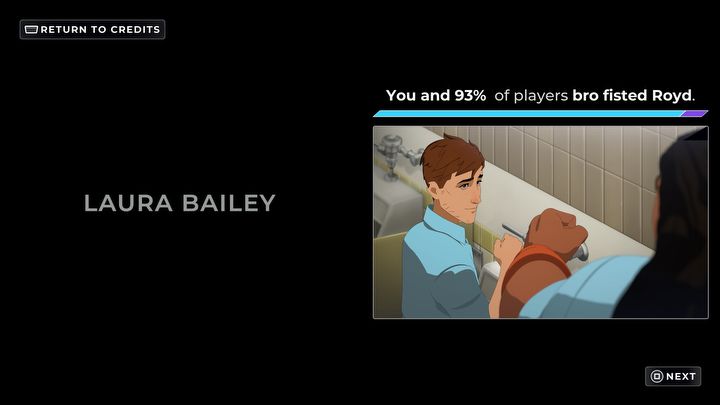
Beyond its well-developed storylines, characters, and relationships, Dispatch is truly hilarious. It successfully blends the realistic and often violent elements seen in shows like The Boys and Invincible with the clever humor of top Marvel films. What’s refreshing is that it doesn’t feel like a copy of anything else, or like it’s intentionally trying to be different. Dispatch is simply a fantastic modern sitcom that also happens to be a great video game.
Final Thoughts
The game Dispatch asks you to guide someone as a mentor. Your choices in this role will affect Robert, the Z-Team, and your own experience as the player. I found myself constantly thinking about the consequences of my decisions throughout the game, and especially after seeing the ending. I spent a lot of time considering what led to that outcome and whether I could have made different choices.
Honestly, there’s so much to love about this game, it’s hard to even cover it all! But the voice acting? Seriously amazing. They have all the usual pros, but some of the casting choices were really surprising – in a good way! I heard they actually built the characters around the actors, and let them improvise and add their own flair. It totally works, because every single character feels important and well-developed. Not a single wasted one!
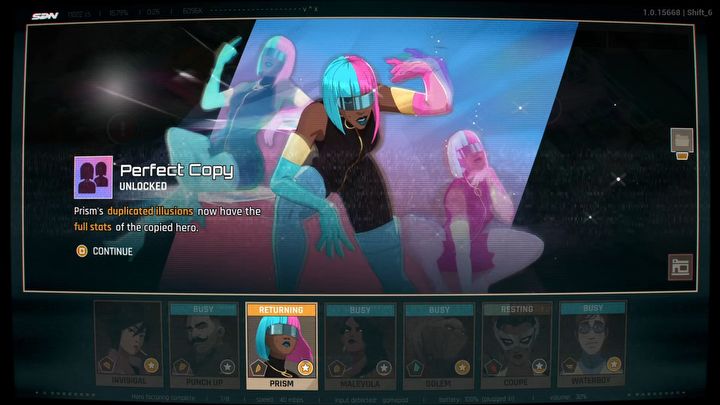
The animation was fantastic, with a really cool art style. Even minor characters were well-designed and interesting – I’m especially curious about the one in the cat costume, which might not even be a costume! I’m also hoping we learn more about Shroud’s team of villains; each one has a unique and intriguing power.
One of the best parts of this game is talking with other players about the different paths they took and how those choices shaped the story. While everyone’s experience isn’t totally unique, you’re bound to miss some things on your first couple of playthroughs. Many decisions have significant, long-term consequences, making you truly feel the impact of what you choose. Whether you’re acting as a guide, trainer, or leader, your choices will often affect more than just yourself.
Dispatch is a genuinely funny sitcom that I’ll happily watch again and again, and recommend to all my friends. I especially appreciate that it’s just one season long, which means each playthrough feels fresh and unpredictable. Honestly, I don’t have many criticisms at all. I’m really hoping AdHoc Studio makes more of this, but I’ll definitely be excited to see what they create in the future.
Read More
- Movie Games responds to DDS creator’s claims with $1.2M fine, saying they aren’t valid
- The MCU’s Mandarin Twist, Explained
- These are the 25 best PlayStation 5 games
- SHIB PREDICTION. SHIB cryptocurrency
- Scream 7 Will Officially Bring Back 5 Major Actors from the First Movie
- All Golden Ball Locations in Yakuza Kiwami 3 & Dark Ties
- Server and login issues in Escape from Tarkov (EfT). Error 213, 418 or “there is no game with name eft” are common. Developers are working on the fix
- Rob Reiner’s Son Officially Charged With First Degree Murder
- MNT PREDICTION. MNT cryptocurrency
- 15 Lost Disney Movies That Will Never Be Released
2025-11-19 12:04